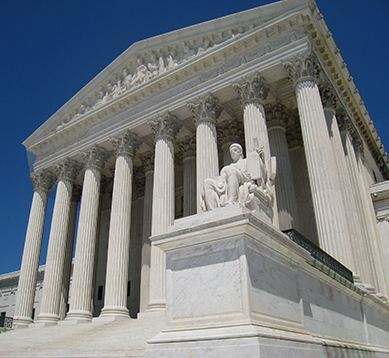U.S. Supreme Court to Decide If Federal Court Can Compel Truck Drivers Working as Independent Contractors To Arbitrate Misclassification Claims
This October, the U.S. Supreme Court is scheduled to hear argument in a case that has had and will have a major impact on the trucking industry—Oliveira v. New Prime, Inc. The Supreme Court has been asked to determine, among other things, whether a federal court can force independent contractors to arbitrate misclassification claims if they are “transportation workers,” for example, truck drivers performing services for motor carriers and freight brokers pursuant to an independent contractor agreement.
For logistics companies that utilize an independent contractor model in one way or another—which is most—arbitration clauses like the one at issue in Oliveira are an important defense against costly and often protracted litigation, frequently in the form of unwieldly class actions. Should the Supreme Court determine that such clauses are unenforceable in federal court under the Federal Arbitration Act (FAA), then it will create substantial uncertainty as to when and where such clauses are enforceable.
Background
New Prime, Inc. is an interstate trucking company that operates a student truck driver apprenticeship program. As part of this program, drivers were relieved of paying tuition if they remain with Prime for one year as either a company driver or an independent contractor. Dominic Oliveira participated in this training program and, upon completion of his apprenticeship, elected to work with Prime as an independent contractor.
Oliveira signed an Independent Contractor Operating Agreement between Prime and Oliveira’s company, Hallmark Trucking LLC. The contract specified that the relationship between the parties was that “of carrier and independent contractor” and not an employer-employee relationship. Additionally, the contract contained an arbitration clause under which the parties agreed to arbitrate “any disputes arising under, arising out of or relating to” the contract in accordance with Missouri’s Arbitration Act “and/or” the Federal Arbitration Act.
Oliveira’s Lawsuit
Oliveira eventually sued Prime in the U.S. District Court for the District of Massachusetts, alleging violations of both state and federal law. The crux of Olivera’s suit was that Prime has misclassified him as an independent contractor when he was in fact an employee. Prime immediately moved to compel arbitration under the FAA.
Oliveira argued, inter alia, that he was excepted from the FAA by its own terms because Section 1 of the FAA provides that the act does not apply “to contracts of employment of seamen, railroad employees, or any other class of workers engaged in foreign or interstate commerce,” i.e., transportation workers. Prime countered that the FAA’s narrow exclusion for agreements with transportation workers does not apply to agreements with independent contractors because they are not “contracts of employment,” and therefore, the matter must go before an arbitrator.
The District Court denied Prime’s motion, holding that: (1) the FAA’s “contracts of employment” language does not extend to independent contractors; and (2) discovery was needed on the issue of whether Oliveira was in fact an employee it could determine applicability of the exception. Prime appealed.
Prime’s Appeal
On appeal, the U.S. Court of Appeals for the First Circuit affirmed the ruling of the District Court, albeit on very different grounds. The Court concluded that agreements with transportation workers establishing or purporting to establish independent-contractor relationships are “contracts of employment” within the meaning of the FAA exception because, at bottom, a “contract of employment” is merely an “agreement to do work,” and the contract between Prime and Oliveira was just that.
Significantly, the Court also emphasized that its holding was limited: “It applies only when arbitration is sought under the FAA, and it has no impact on other avenues (such as state law) by which a party may compel arbitration.”
Impact of the First Circuit Decision
The decision of the Appeals Court, and by extension, the anticipated decision of the U.S. Supreme Court, has and will have a sweeping impact on transportation industry workers—namely, truck drivers operating as independent contractors and the companies relying on these drivers to run their business in a cost-efficient way. Arbitration clauses invoking the FAA are frequently used by logistics companies to ward off expensive and time-consuming misclassification lawsuits, frequently in the form of class actions. Should the Supreme Court determine that such clauses are unenforceable in federal court under the FAA, then it will create substantial uncertainty as to when and where such clauses are enforceable. Defendants might be forced to rely instead on the application of state arbitration laws, which vary widely across the nation, to enforce these clauses.
Moving Forward
Until the U.S. Supreme Court reaches a decision, there will be uncertainty as to whether arbitration agreements like that at issue in Oliveira will be enforceable in federal court. Companies relying on these agreements should be aware that they may be rendered hollow in the wake of the U.S. Supreme Court’s decision.
If you have any questions or need additional information concerning this topic, please contact Richard Bickelman or Laura Otenti.
This Alert is provided for information purposes only, and does not constitute legal advice. According to Mass. SJC Rule 3:07, this material may be considered advertising. ©2018 Posternak Blankstein & Lund LLP. All rights reserved.



